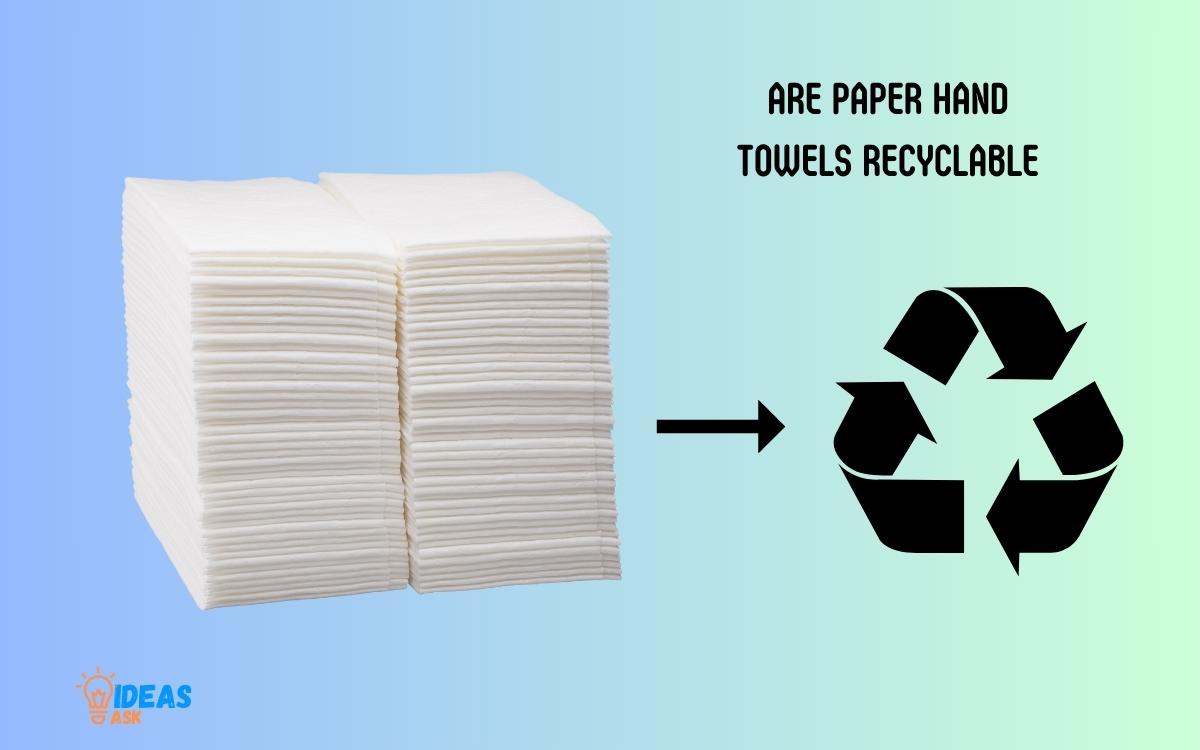Are Paper Hand Towels Recyclable? Yes!
Yes, paper hand towels are technically recyclable. However, it’s important to note that not all recycling facilities accept them due to potential contamination with food, grease, or other non-recyclable materials.
While paper hand towels are technically recyclable, their potential for contamination often makes them unsuitable for the recycling process.
It’s best to check with your local recycling facility to see if they accept paper hand towels. Always remember, when in doubt, throw it out to prevent contaminating recyclable materials.

Key Takeaway
Understanding The Environmental Impact Of Paper Hand Towels
Paper hand towels can have a significant environmental impact, but many are recyclable. Understanding the recyclability of paper hand towels can help minimize waste and promote sustainable practices.
The Rise Of Disposable Hand Towels
- Disposable hand towels have become increasingly popular in recent years due to their convenience and hygienic properties.
- They are commonly found in public restrooms, offices, and even homes, offering a quick and efficient solution for hand drying.
- The rise of disposable hand towels has raised concerns about their environmental impact and whether they are recyclable.
The Impact On Landfill Waste
One of the main concerns surrounding disposable hand towels is the accumulation of waste in landfills. As these towels are designed for single-use, they contribute to the growing waste problem globally.
Here are some key points to consider regarding their impact on landfill waste:
- Disposable hand towels, when thrown away after use, end up in landfills where they take up valuable space.
- The accumulation of these towels contributes to the already extensive waste management challenges faced by many countries.
- The decomposition process of paper hand towels in landfills can take several weeks, and they release methane gas, a potent greenhouse gas, during this process.
The Relationship Between Paper Production And Deforestation
Another important factor to consider is the link between paper production and deforestation. The demand for paper products, including hand towels, has led to an increase in deforestation rates globally.
Here are the main points to understand about the relationship between paper production and deforestation:
- Paper production, including the manufacturing of disposable hand towels, requires the harvesting of trees, often from natural forests.
- Large-scale deforestation leads to the loss of critical habitats, disrupts ecosystems, and contributes to the loss of biodiversity.
- Sustainable alternatives to paper hand towels, such as recycled or tree-free options, can help mitigate the environmental impact and reduce deforestation rates.
The rise of disposable hand towels has had significant environmental consequences, particularly in terms of landfill waste and deforestation.
Understanding the impact of these towels is essential in making informed decisions regarding their use and exploring more sustainable alternatives.
Exploring The Recycling Potential Of Paper Hand Towels
Paper hand towels have the potential to be recycled, making them an eco-friendly option for personal hygiene. These towels can be collected and processed to create new paper products, reducing waste and promoting sustainability.
The Composition Of Paper Hand Towels:
- Paper hand towels are made from wood pulp, which is a renewable resource.
- They are often bleached with chemicals to achieve a white color, making them less eco-friendly.
- Some paper hand towels may also contain additives such as dyes, fragrances, or lotions, which can complicate the recycling process.
The Challenges Of Recycling Paper Hand Towels:
- Contamination: Paper towels used for cleaning purposes often come into contact with grease, oil, or other substances that make them less suitable for recycling.
- Fiber quality: Paper towels have shorter and weaker fibers compared to other paper products, making them less valuable for recycling.
- Lack of demand: The recycling market for paper hand towels is relatively limited, as many recycling facilities prioritize higher-quality paper products.
Recycling paper hand towels poses unique challenges due to their composition and potential contamination.
Despite being made from a renewable resource, the bleaching and additives used in their production can hinder the recycling process.
Additionally, the shorter and weaker fibers of paper hand towels make them less desirable for recycling facilities, limiting the market demand for such products. It’s important to consider sustainability when using paper hand towels.
Whenever possible, opt for alternatives like cloth towels or air dryers that reduce the environmental impact. Remember, making conscious choices can contribute to a greener future.
Factors Affecting The Recyclability Of Paper Hand Towels
Paper hand towels can be recyclable, but their recyclability depends on certain factors. The type and quality of the paper, contamination levels, and the availability of recycling facilities play a significant role in determining whether paper hand towels can be recycled effectively.
Paper hand towels are widely used in various settings, whether it’s in public restrooms, kitchens, or during events. However, when it comes to recycling, not all paper hand towels are created equal.
Several factors can affect the recyclability of these towels, and it’s important to understand these factors to make informed choices about their usage and disposal.
Contamination And Dirty Paper Hand Towels:
Contamination is one of the primary factors that can hinder the recyclability of paper hand towels. When paper towels are used for cleaning up spills, wiping off dirt, or drying oily surfaces, they become dirty and can contain various contaminants.
Here are some points to consider:
- Food waste: Paper hand towels used in kitchen or food service settings may be contaminated with leftover food, oils, or other organic residues.
- Chemicals and solvents: In industrial or commercial settings, paper towels may come into contact with chemicals, paints, or solvents, which can affect the quality of the fiber and make recycling more challenging.
- Biological waste: In healthcare facilities or other places where biological waste is present, paper hand towels may be contaminated with bodily fluids or other potentially harmful substances.
- Mold or mildew: If paper towels are stored in a damp environment, they can develop mold or mildew, rendering them unsuitable for recycling.
Treatment Processes For Recycled Paper:
To make paper hand towels recyclable, they need to go through various treatment processes. These processes help remove contaminants and transform the used paper towels into reusable fiber.
Here are the steps involved:
- Collection and sorting: Used paper hand towels are collected separately from other waste and sorted based on their quality and level of contamination.
- Cleaning and decontamination: Paper towels go through cleaning processes to remove dirt, chemicals, and other contaminants. Deinking agents may be used to remove ink or dyes from the paper.
- Pulping and screening: The cleaned paper towels are mixed with water to create a pulp, which is then screened to remove impurities like plastic or large debris.
- Refining and drying: The pulp is refined to improve its quality and then dried to remove excess moisture before it can be used to make new paper products.
The Role Of Technology In Paper Hand Towel Recycling:
Technology plays a crucial role in the recycling of paper hand towels, enabling more efficient and effective processes.
Here are some ways technology contributes to the recycling industry:
- Automated sorting: Advanced sorting technologies, such as optical scanners and magnetic separators, help identify and separate recyclable paper towels from other waste materials.
- Innovative deinking methods: New technologies are being developed to improve the deinking process, making it more efficient in removing ink and dyes from used paper towels.
- Energy-efficient pulping: Modern pulping technologies consume less energy and water compared to traditional methods, making the recycling process more environmentally friendly.
- Quality control measures: Technology allows for better quality control throughout the recycling process, ensuring that the resulting recycled fiber meets industry standards.
Several factors impact the recyclability of paper hand towels, including contamination, treatment processes, and technological advancements.
By understanding these factors, we can make informed decisions about the use and disposal of paper hand towels, promoting sustainable practices and reducing waste.
With advancements in recycling technology, the future looks promising for improving the recyclability of paper hand towels and other paper products.
The Benefits And Drawbacks Of Recycling Paper Hand Towels
Paper hand towels offer several benefits and drawbacks in terms of recycling. While they can be recycled, the process can be time-consuming and costly.
Additionally, recycling paper hand towels may not always be the most sustainable option, as the process consumes energy and water.
Paper hand towels are commonly used in public restrooms, office spaces, and various establishments. With the increasing focus on sustainability, many people are wondering if paper hand towels are recyclable.
The Environmental Benefits Of Paper Hand Towel Recycling
Recycling paper hand towels can have several positive impacts on the environment:
- Reduces deforestation: Recycling paper hand towels helps decrease the demand for fresh trees, thereby conserving forests and preserving wildlife habitats.
- Minimizes landfill waste: By diverting paper towels from landfills, recycling reduces the amount of waste that ends up in our already overflowing landfills.
- Saves energy and reduces greenhouse gas emissions: Recycling paper hand towels requires less energy compared to producing them from virgin fibers. This results in lower carbon emissions, contributing to the fight against climate change.
The Energy And Water Consumption In Recycling Paper Hand Towels
While recycling paper hand towels offers environmental benefits, it is important to consider the energy and water consumption involved in the recycling process:
- Energy consumption: Recycling paper hand towels consumes less energy compared to manufacturing them from scratch. However, the recycling process still requires electricity for transportation, sorting, and pulping.
- Water consumption: Recycling paper hand towels also utilizes water for cleaning and de-inking the collected paper. Efficient water management practices can help minimize the overall impact on water resources.
The Economic Feasibility Of Paper Hand Towel Recycling
When evaluating the economic feasibility of paper hand towel recycling, we must consider the following factors:
- Availability of recycling infrastructure: The existence of recycling facilities and programs varies across regions. Access to convenient recycling options can impact the feasibility of recycling paper hand towels.
- Market demand for recycled paper: The demand for recycled paper products plays a crucial role in determining the economic feasibility of recycling efforts. Increasing demand can stimulate the growth of recycling programs.
- Cost-effectiveness: Recycling paper hand towels may incur certain costs for collection, transportation, and processing. Balancing these costs with the benefits obtained from recycling is essential for assessing economic feasibility.
Recycling paper hand towels provides environmental benefits such as reduced deforestation and minimized landfill waste.
However, it is important to be aware of the energy and water consumption involved in the recycling process.
Evaluating the economic feasibility of recycling depends on factors such as recycling infrastructure and market demand for recycled paper products.
By understanding these aspects, we can make informed decisions regarding the recycling of paper hand towels.
Best Practices For Recycling Paper Hand Towels
Looking to recycle paper hand towels? Discover the best practices for recycling these eco-friendly alternatives. Join the sustainability movement and reduce waste by correctly disposing of paper hand towels.
Paper hand towels are a common item found in many establishments, from restaurants to office buildings. But when it comes to disposing of them, many people are unsure if paper hand towels are recyclable.
Proper Disposal And Collection Methods:
- Separate paper hand towels from other waste: Make sure to separate paper hand towels from other garbage to ensure they can be properly recycled.
- Avoid contamination: Keep paper hand towels clean and dry to prevent contamination from substances like food or liquid, which can make recycling difficult.
- Check with your local recycling guidelines: Different areas may have different recycling guidelines, so be sure to check with your local municipality to find out the proper disposal and collection methods for paper hand towels.
Tips For Maximizing Recyclability:
- Use unbleached paper hand towels: Unbleached paper hand towels are typically easier to recycle as they don’t contain chemicals used in the bleaching process.
- Reduce excess liquid: If your paper hand towels are damp or wet, gently wring out the excess liquid before disposing of them. This helps prevent them from becoming too saturated and facilitates the recycling process.
- Avoid using paper hand towels for hazardous substances: If paper hand towels come into contact with hazardous substances like chemicals or oil, they may not be suitable for recycling. Consider using an alternative solution for these types of spills.
Alternative Solutions To Paper Hand Towels:
- Cloth towels: Using reusable cloth towels instead of paper hand towels is an eco-friendly alternative. They can be easily washed and reused, reducing waste and promoting sustainability.
- Hand dryers: Installing hand dryers in restrooms can significantly reduce the need for paper hand towels. Hand dryers use air to dry hands, eliminating the use of paper altogether.
- Air dry or shake dry: In certain situations, air drying or shaking hands dry can be a viable alternative to using paper hand towels. This reduces waste and eliminates the need for disposal.
Remember, proper disposal and recycling of paper hand towels are essential for minimizing waste and protecting the environment.
By following these best practices and considering alternative solutions, we can all play a part in promoting sustainability and reducing our ecological footprint.
Conclusion
It is clear that paper hand towels can indeed be recycled, making them an eco-friendly option for personal hygiene.
Recycling paper hand towels helps conserve resources, reduce waste, and minimize environmental impacts. By opting for recycled paper hand towels, you can contribute to a more sustainable future.
Furthermore, many companies and organizations are now prioritizing sustainability and are introducing recycling programs in their facilities. This trend highlights the growing awareness and importance of recycling paper hand towels.
Additionally, advancements in recycling technology have made the process more efficient and cost-effective. When it comes to choosing the right paper hand towels, look for those made from recycled and responsibly sourced materials.
By selecting these environmentally-friendly options, you can support sustainable manufacturing practices and reduce your carbon footprint. Recycling paper hand towels is paramount in creating a greener and cleaner world.
By making small changes in our daily lives, such as opting for recyclable paper hand towels, we can collectively make a significant impact on the environment. Let’s choose sustainability and take steps towards a more sustainable future.






